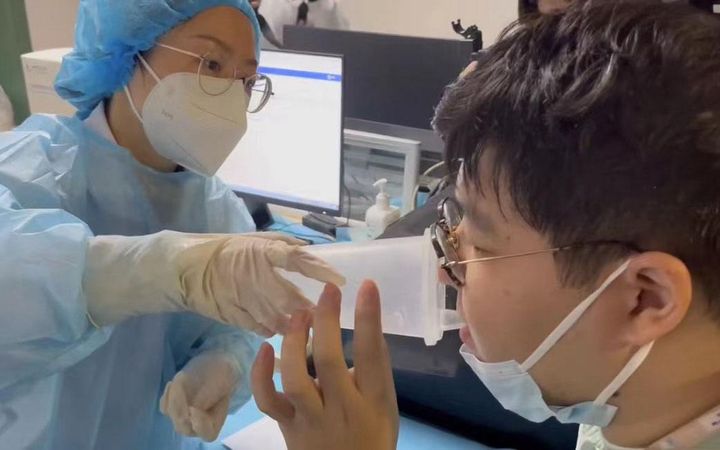On October 25, Shanghai released official news that according to the work deployment of the Joint Prevention and Control Mechanism of the State Council, Shanghai will start the inhalation of recombinant COVID-19 virus vaccine (type 5 adenovirus vector) to strengthen immunization appointment registration for people aged 18 and over. The free vaccination program for booster immunization will be launched on October 26.

Last month, China approved the country’s first inhaled COVID-19 vaccine, produced by CanSino Biologics. As of the close on October 25, CanSino A shares (688185.SH) rose 3.8%, and CanSino Hong Kong shares (6185.HK) rose rapidly before the close, closing up nearly 9%.
This is also the first large-scale booster immunization for the inhaled vaccine since it was approved by the State Food and Drug Administration for emergency use authorization last month. However, inhaled vaccines are not currently used for basic immunization. In addition, according to relevant national requirements, Shanghai citizens currently only need to receive one dose of homologous booster immunization or sequential booster immunization.
CanSino published the latest vaccine clinical trial data on the preprint website on July 29, showing that the inhaled COVID-19 vaccine candidate developed by the company, as a heterologous immune booster, can effectively deal with the COVID-19 Omicron BA.1 mutation strains and elicit higher antibody responses than homologous immunization. However, no studies have been conducted on the neutralization of the inhaled vaccine against the currently prevalent Omicron BA.4 and BA.5 variants.
According to the relevant vaccination requirements, the dose of inhalation dosage form is 0.1mL per administration. CanSino’s previous research has shown that inhaled vaccines can save vaccine doses compared with intramuscular vaccines on the premise of ensuring a stronger immune response. Subjects boosted with 0.1 mL or 0.2 mL of inhaled vaccine produced significantly higher antibody responses than IM 0.5 mL of inactivated vaccine, which can be used at doses as low as 20% of inactivated vaccine.
In addition, immune persistence studies showed that high levels of neutralizing antibodies were maintained after 6 months of heterologous vaccination with the inhaled recombinant COVID-19 virus vaccine.
According to reports, for the entire inoculation of Sinopharm Group China Biotechnology Co., Ltd. Beijing Institute of Biological Products Co., Ltd., Sinopharm Group China Biotechnology Co., Ltd. Wuhan Institute of Biological Products Co., Ltd., Beijing Kexing Zhongwei Biotechnology Co., Ltd. The inactivated vaccine produced and the intramuscular recombinant COVID-19 vaccine (type 5 adenovirus vector) produced by CanSino Biologics Co., Ltd. can be used for inhalation. 1 booster immunization with viral vaccine (adenovirus type 5 vector).
The principle of adenovirus inhaled COVID-19 vaccine is to use an adenovirus vector that is harmless to the human body to deliver the genetic material expressing the S protein into the human body, and use an atomizer to atomize the vaccine into tiny particles, which are inhaled through the oral cavity. Breathing reaches the lung tissue, triggering the triple immunity of mucosa, humoral and cells.
Experts say an inhaled vaccine could be an important addition to existing COVID-19 vaccines. Compared with intramuscular vaccines, inhaled vaccines are expected to hold the “first line of defense” for the virus to enter the human body through the respiratory mucosal immune response, and induce innate and adaptive immunity in mucosal tissues to provide more protection.
“If the human body is compared to a castle, then the intramuscular vaccine we inoculate can be regarded as protecting the inner area of the castle. Once the intruder enters, the immune defense line will be activated.” A virus immunology expert told Yicai.com reporter , “But the virus has entered the body at this time, and the process of immune activation can prevent severe illness; and if the immune system can be trained to defend at the gate of the castle, it will not only be difficult for intruders to enter, but also more difficult to spread inside.”
Introduction to Aerosol Vaccines
Aerosol inhalation vaccines refer to vaccines vaccinated by aerosol inhalation, not by injection. Only one-fifth of the dose of the injection vaccine is required, and the bottleneck problem of the vaccine bottle can also be solved. In August 2020, the team of Academician Chen Wei published the research results of non-injection vaccines. On September 29, clinical trials were carried out in Wuhan. On June 3, 2021, at the plenary meeting of the Pujiang Innovation Forum, Academician Chen Wei said that the Food and Drug Administration has approved the approval for clinical expansion, and now we are applying for emergency use. From November 12th to 14th, the inhaled COVID-19 vaccine was unveiled at the “Hainan Health Expo”.
Immune principle of aerosol inhalation vaccine
The so-called aerosol inhalation immunity means that the vaccine is atomized into tiny particles by a nebulizer, and enters the respiratory tract and lungs through inhalation, thereby stimulating mucosal immunity, which cannot be brought by intramuscular injection. Typically, COVID-19 vaccines administered intramuscularly can only induce humoral and cellular immunity. In addition, immunization using aerosol inhalation is painless and has higher accessibility.
Related news
Recently, Jiangsu began to promote “inhalation” COVID-19 vaccination. On October 31, the Yangzhou Tangwang Community Health Service Center welcomed the first batch of citizens who came to receive the “inhaled” COVID-19 vaccine. At the same time, Huaian has also started related work. After making an appointment in advance, citizens can go to the vaccination point to complete the vaccination. The “inhalation” COVID-19 vaccination takes less than one minute, and if there is no abnormality after the vaccination, nucleic acid sampling can be carried out on the same day. It is understood that many places in Jiangsu are promoting the “inhalation” COVID-19 vaccination work, or are making related preparations.